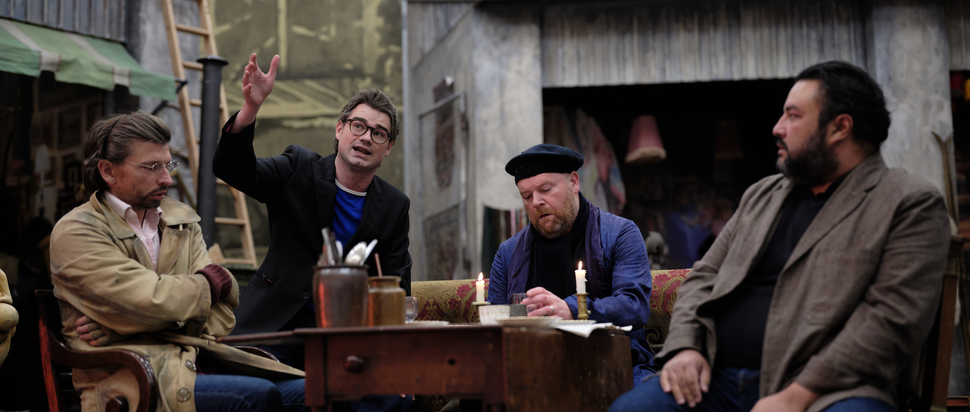Modernist Classic: Scottish Opera's La bohème returns
As its Scottish tour continues, we delve into Scottish Opera's revival of Puccini's La bohème by directors and designers Barbe & Doucet
For Hye-Youn Lee, the soprano taking on the latest incarnation of Mimi – among her favourite parts to sing – in La bohème, story is everything. Citing La Traviata and Madama Butterfly alongside La bohème, Scottish Opera’s upcoming revival of its 2017 production, Lee can be called a credible authority when it comes to the standard Italian repertory. This class represents some of the most iconic operas in history, not least several by Giacomo Puccini, whose smash successes like La bohème – first staged in 1896 and frequently performed to this day – persist in pop culture and modern-day media.
Lee credits La bohème’s relevance to its story, the characters, topics, and conflicts it faces head-on, but also interestingly Puccini’s score itself, all of which lend the opera to "adaptability". Beyond the success of contemporary stories that adapt these operas, like Jonathan Larson’s Rent or the jukebox musical Moulin Rouge!, the production history of La bohème during the 20th and 21st centuries reveals that Puccini’s opera and those like it motivate adaptation and reinterpretation with a contemporary swing. After all, La bohème has been set in as diverse contexts as 1957 USA and the cultural bombshell of 1920s Paris, the setting of Scottish Opera's 2017 production by design, stage direction and choreography team Barbe & Doucet. Now, eight years later, Hye-Youn Lee returns to this modernist metropolis with a 'developed' revival of one of the opera’s most endearing works.
In Puccini's original setting, we have a painter, poet, philosopher and musician struggling to live in an 1830s garret at Christmas time. There's a landlord who comes for their rent. A seamstress with consumption who lives in their building, who falls in love with the poet. A singer who used to love the painter and the wealthy government minister courting her now. Three acts. A platter of bohemians who create for a living, and thus struggle to live, and the various contemporary dilemmas they must face, from financial insecurities to sickness and death – not merely 19th century problems. Puccini’s opera is about young love, friendship, loss, doubt, innocence and the ins and outs of la vie bohème. According to Lee, there is something for everyone in the story and, specifically, the Scottish Opera’s forthcoming revival – for audiences of all generations, even children – whether that’s the themes themselves or this production’s illustrious scenic design and choreography.
No doubt, the themes of La bohème are universal. They continue to connect with the lived experiences and passions of audiences worldwide, and in the opera’s countless stagings over its past 130-year existence. Whether we take Rent, the Pulitzer Prize-winning musical brimming with the nerve-endings of Puccini’s original, or the English libretto used by Canada’s Against the Grain Theatre in 2019, the same central situations, conflicts, and misfortunes permeate every iteration. La bohème’s story is not necessarily contemporary by definition, though its close-up focus on poverty can be viewed as progressive, its central characters and concerns clearly make for effective retellings and unique renditions. This continuing search in every new staging of this thoroughly staged opera has been at the heart of the rehearsal process for Barbe & Doucet’s upcoming La bohème, as it was in their celebrated 2017 version – a search which has transported Puccini’s story to the hustle and bustle of Paris in the ‘crazy years’.
With design inspired by the fantasy comedy film Midnight in Paris, we can expect Barbe & Doucet’s production to engage with the theme of time, not just as a motif in the story, but in the form of questions surrounding the longevity and pertinence of La bohème itself: how we correlate with the past and what the past unveils in the present. We can expect, in Lee’s words, a 'visually stunning' production, presented by a virtuosic ensemble and creative team. We can expect an enthralling, emotional run to herald the Scottish winter. And, importantly, for those who caught the production in its previous iteration, we can expect a new staging that draws and fulfills the adventurous artistry that revitalised Puccini’s masterpiece on the Scottish stage eight years ago.
Scottish Opera: La bohème, His Majesty's Theatre, Aberdeen, 30 Oct & 1 Nov; Eden Court, Inverness, 6 & 8 Nov; Festival Theatre, Edinburgh, 14-22 Nov
